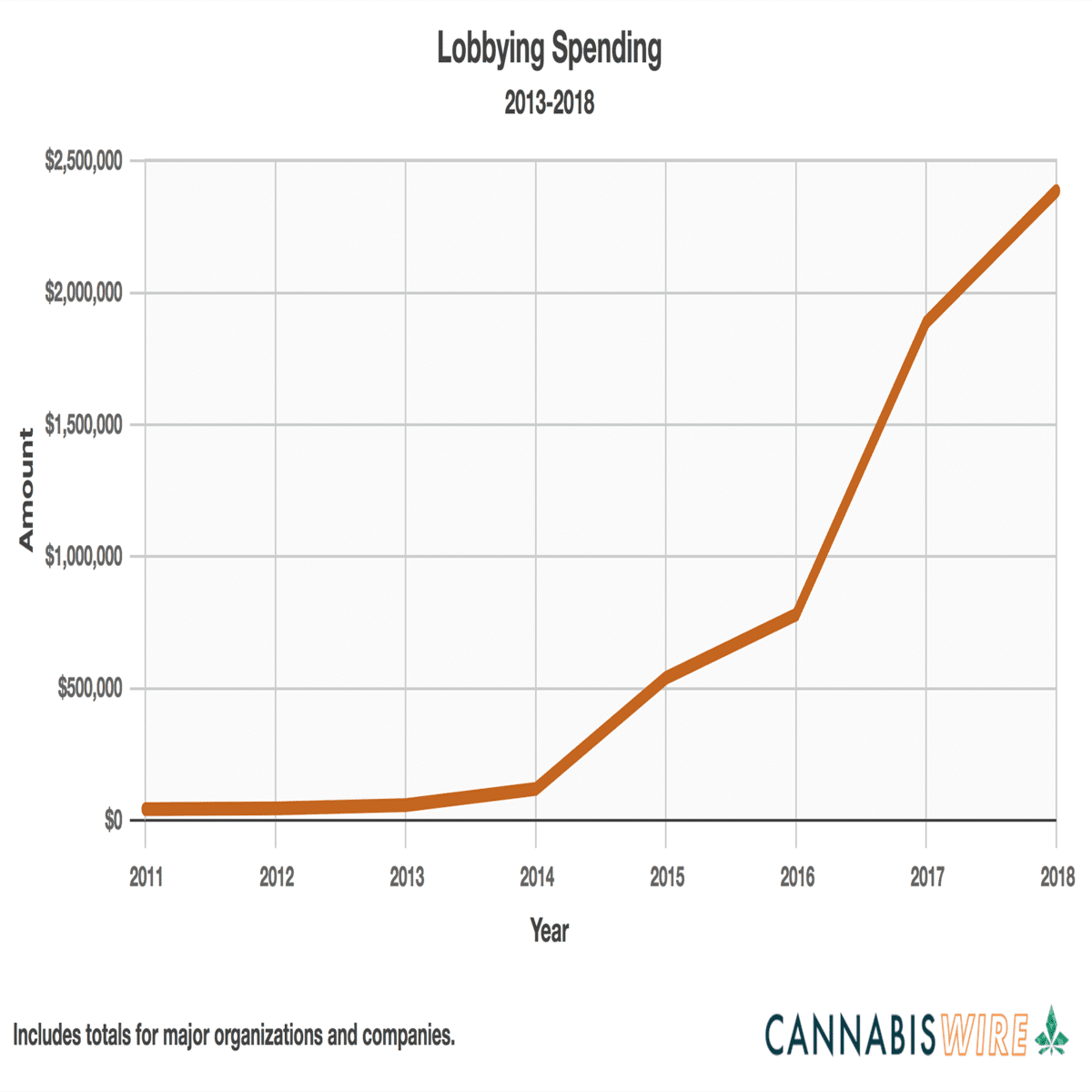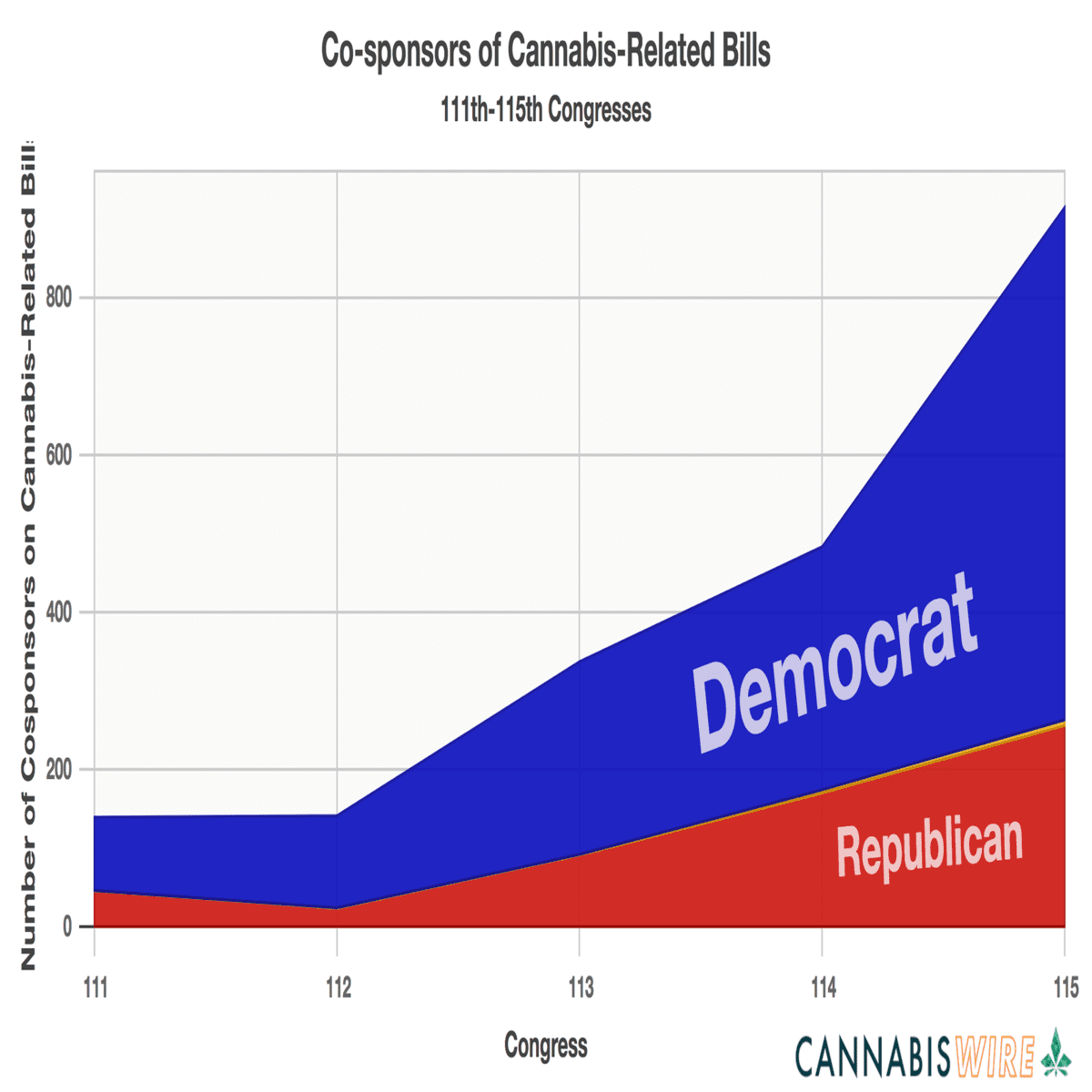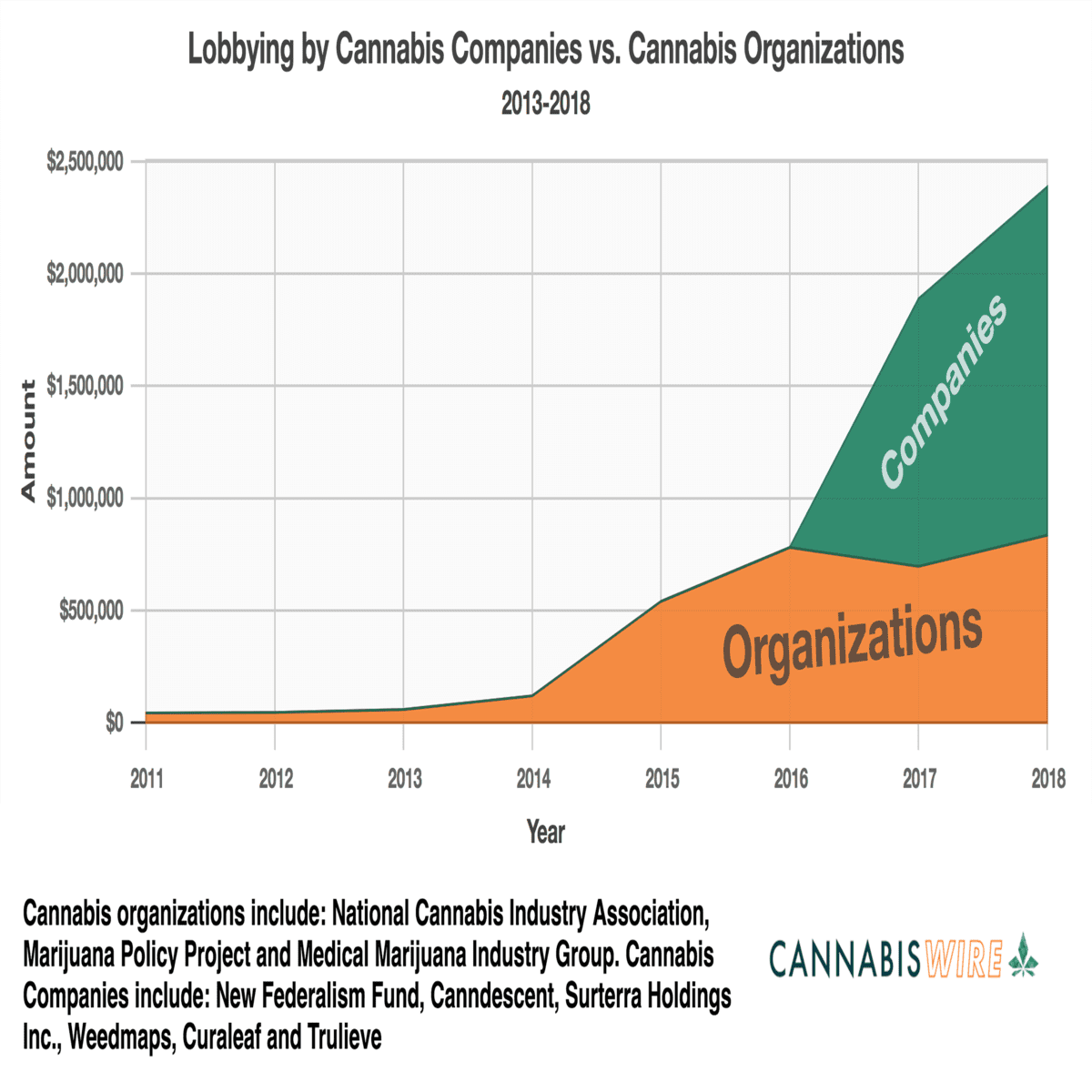Two related articles, first is an intro to the series and the next is Part I.
Cannabis Goes To Washington
A burgeoning industry is using its money to influence politics, and finding new GOP allies in the process. But there may be a price.
In August of 2017, a mysterious political action committee formed called the Federalist Freedom Fund. It was a joint fundraising committee between two Republican congressmen, Carlos Curbelo and Mike Coffman, as well as the two major Republican election committees, the National Republican Congressional Committee and the National Republican Senate Committee. Within a month, it raised $187,700. Six months later, it shut down and the money was disbursed four ways.
On its surface, the Fund was a standard PAC meant to support Republican causes, although it had no website or mission statement. Only after
looking at the PAC’s donors would its purpose become clearer: Every single one of its donors was a giant in the booming multibillion-dollar cannabis industry. Coffman and Curbelo, who both lost reelection bids in the midterm elections last Tuesday, not only represent the key adult-use and medical cannabis markets of Colorado and Florida, respectively, but they have been rare and vocal cannabis backers in a GOP-dominated Congress.
Today, two in three Americans support legalization, according to an October Gallup
survey, the type of overwhelming voter support that has begun to push even the most resistant politicians to embrace the issue.
SUBSCRIBE TO CANNABIS WIRE'S MORNING NEWSLETTER
Original news and analysis from veteran journalists—straight to your inbox every weekday morning. (This newsletter is free now, but will soon be available only to subscribers.)
Email Address
The formation of the Federalist Freedom Fund marked a significant turning point. The cannabis movement has given birth to a cannabis industry, and that industry, like any other, wants to promote its own interests. And now the industry has matured enough to afford to set and pursue its own priorities. It’s not uncommon for CEOs to support candidates who support them, so the fact that cannabis businesses donated to Coffman and Curbelo should come as no surprise. But because of how the money was split, the Fund’s donors also supported all Senate and Congressional Republicans—an example of how the new cannabis industry has begun to wade more aggressively into the political sphere, and to court Republican lawmakers. The party’s support for states’ rights and free markets overlaps with the goals of an increasingly wealthy industry that is focused on taking care of business. Priorities are shifting. What gets lost and gained in the process?
Meanwhile the days of grassroots and philanthropist-backed efforts—spearheaded for decades by the movement’s pioneer cannabis advocacy groups like the National Organization for the Reform of Marijuana Laws (NORML), formed in 1970, and the Marijuana Policy Project (MPP) formed in 1995—could be waning. And, looking to cannabis law reform in the coming years, these groups could see their influence diminished in Congress, as the emerging industry opens its checkbook for lobbyists and lawmakers, potentially pulling focus toward business interests and away from, for example, criminal justice-related priorities.
When it comes to federal lobbying and direct donations to candidates and their PACs, the largest and oldest cannabis organizations in the country have already been dramatically outspent this year: Just under $1 million was spent by cannabis organizations, and just under $2 million by cannabis companies and their executives. Across the board, that spending is on the rise.
Image credit: Ben Jay
This is not a lot of money when compared with what other industries spend in Washington, DC. But it’s indicative of a foundational shift toward business-friendly legislation and priorities, a sea change that goes deeper than the flip of the House to Democrats in the midterm election.
In this series, we will explore these changing dynamics to ask what these new players and priorities mean for the future of cannabis in America.
PART I: Cannabis Courts the Grand Old Party
The cannabis debate in Congress is being reshaped along GOP-friendly lines.
Many Republicans in Congress often assert two core beliefs: states’ rights and free markets. And though the Democrats managed to turn the House blue in the midterms, the only way cannabis legislation will move through a GOP Senate and White House in the near future is on a bipartisan basis. That reality comes as the cannabis debate in Congress is beginning to be reshaped along GOP-friendly lines.
Because cannabis is no longer in the domain of an anti-corporate counterculture, it is becoming a more natural sell. Already, pharmaceutical, tobacco, alcohol, and beverage industries—all hefty spenders in Washington—have begun to formulate plans for cannabis-based products, from Coca-Cola’s trial balloon interest in CBD beverages to the record $4 billion investment by Constellation Brands, the parent company of Corona beer, in one of the largest Canadian cannabis companies.
Where the industry forms alliances in Congress will shape its future, partly because it is so young. Despite the industry’s multibillion dollar growth and potential, these are early years: The first legal adult-use sales in the US began in 2014.
During the past two years, the cannabis industry has sought to push not just cannabis legalization, but a business-friendly list of goals in Congress, including
tax reform. Increasingly, members of the GOP—previously staunchly anti-cannabis, with few exceptions—are supporting those legislative efforts. Even if lawmakers are simply responding to a new political landscape as more states legalize, the pace at which the GOP has begun to display a more receptive attitude on cannabis has been swift.
Cannabis Wire’s review of government data found a ten-fold increase over the last seven years in the number of GOP House and Senate members who have sponsored or cosponsored bills and resolutions related to cannabis: from twenty-three co-sponsors in 2011 and 2012, to 256 from 2017 to the present—the most in any Congress.
Democrats, meanwhile, have hardly been sitting on the sidelines. They have also dramatically increased their participation as co-sponsors during the same period, from 117 to 652, or nearly five-fold.
Image credit: Ben Jay
On the Republican side, to be sure, the cannabis romance remains somewhat tentative. Former Attorney General Jeff Sessions, the nation’s top law enforcer until President Trump forced him out right after the midterm election, has been obstinate when it comes to cannabis. In January, Sessions, a Republican from Alabama, ruffled Democrats and Republicans alike with his anti-cannabis rhetoric and repeal of Obama-era protections against federal meddling in state-legal cannabis activity.
Party leaders have distanced themselves from the national public discussion over legalization, and one Republican in particular became a legislative roadblock: From his perch as chairman of the House Rules Committee, Texas Republican Congressman Pete Sessions frustrated many in the cannabis law reform community by blocking some cannabis-related measures from advancing. The Texas Cannabis Industry Association targeted Sessions for his anti-cannabis views, perhaps contributing to his loss Tuesday to Democrat Colin Allred, who supports medical cannabis. Oregon Representative Earl Blumenauer, co-chair of the Congressional Cannabis Caucus, formed in 2017, recently told
Cannabis Wire, “Pete Sessions is enemy number one.” House Speaker Paul Ryan, meanwhile, has said and done little on the issue.
Yet these factors effectively hid the churn of action below the surface.
SUBSCRIBE TO CANNABIS WIRE'S MORNING NEWSLETTER
Original news and analysis from veteran journalists—straight to your inbox every weekday morning. (This newsletter is free now, but will soon be available only to subscribers.)
Email Address
Over the past two years,
Cannabis Wire found, major cannabis industry players spent $218,100 on GOP-aligned candidates and PACs and $95,000 on Democratic-aligned candidates and PACs, according to the most recent FEC filings.
Some of these players:
• Brendan Kennedy, a founder of Privateer Holdings,
donated $20,000 to groups and candidates aligned with the GOP and $9,400 to Democrats.
• LivWell CEO John Lord
donated $36,300 to GOP candidates and affiliated PACs, and $11,000 to campaigns and PACs affiliated with Democrats during that time period.
• In just the last two years, MedMen CEO Adam Bierman
donated $28,600 to Democrats and affiliated PACs and $14,100 to members of the GOP and Republican-affiliated PACs.
Don Murphy, a lobbyist for the Marijuana Policy Project (MPP) and a former GOP member of the Maryland legislature, said of the cannabis industry, “If you want to be a player you’ve got to play,” adding, “You need to be supportive of the people who support you. If you don’t help these guys they could end up losing, and those who were against our position will say, ‘Look what it got them.’”
This year, MPP, which works primarily at the state level as one of the oldest cannabis advocacy groups in the country and is responsible for the passage of many medical and adult-use cannabis laws in place today, spent $26,000 on federal candidates and PACs (of $110,242 raised for those purposes). Of that total, $12,000 went directly to Republican campaign committees. And just under half of that $12,000 went to Representative Dana Rohrabacher, a California Republican and longtime supporter of cannabis legalization. Rohrbacher lost his reelection bid last Tuesday. While cannabis legalization is typically linked to more liberal politics, Rohrabacher has a particularly #MAGA perspective: He opposes immigration reform and supports Russian President Vladimir Putin.
Murphy told
Cannabis Wire that the group supports its allies, period. “It wasn’t long ago that Democrats controlled everything and we got nothing,” he said, referring to the first two years under the Obama presidency.
Rohrabacher was not the only unexpected GOP advocate in Congress using cannabis money to help support a campaign. For example, Surterra, a medical cannabis company with businesses in Florida and Texas, contributed to Florida Republican Representative Matt Gaetz’s successful re-election bid,
donating $15,000 to a Gaetz-affiliated Super PAC, North Florida Neighbors, according to the latest campaign filings; the company’s CEO also gave $10,800 to Gaetz’s
campaign committee. Gaetz has become one of the most outspoken cannabis advocates in Congress and in his home state, where voters cast ballots to legalize medical cannabis in 2016. He has also been in the news lately for another reason:
perpetuating the myth that billionaire George Soros paid migrants to flood the US.
Representative Tom Garrett, a Republican from Virginia who is leaving Congress, told
Cannabis Wire that industry dollars would begin to influence members of Congress. Money in Congress, he said, matters.
“I’m not saying that everybody here alters their vote based on who supports them monetarily,” he said. “I’m just saying that a lot of people do.”
Republicans have become more outspoken about legislation that is most important to the cannabis industry. Senator Cory Gardner, Republican from the purple state of Colorado, went head-to-head with Trump by blocking his Department of Justice nominations until Trump promised in April not to interfere in state-legal cannabis. Gardner then teamed up with Democratic Senator Elizabeth Warren to push the Strengthening the Tenth Amendment Through Entrusting States Act, commonly called the STATES Act. The
measure would protect state-legal cannabis activity from federal interference, and would address many industry concerns that result from federal prohibition, such as access to banking. (The measure falls short of national legalization, which means many criminal justice questions would remain unanswered.)
And Senate Majority Leader Mitch McConnell has become Congress’ most outspoken advocate for hemp, and is pushing for full hemp legalization under the 2018 Farm Bill. (While McConnell is not in support of marijuana law reform, hemp is linked to the broader cannabis issue since its legality falls into a gray area under the Controlled Substances Act and since there is some industry overlap when it comes to CBD products.)
Already, some cannabis industry members have specifically targeted the GOP to work on a core business priority: tax reform. Patrick Raffaniello is a longtime lobbyist mostly on tax issues, including
work for PricewaterhouseCoopers and the National Rifle Association. He was contracted by a new cannabis industry political fundraising group called the New Federalism Fund (NFF), a non-profit formed in 2017 and funded primarily by executives of three of the industry’s leading companies: LivWell, Scotts Miracle-Gro, and Privateer Holdings, according to federal lobbying disclosures.
It had a very specific goal. “NFF, at the beginning of last year, formed itself to try to talk to Republican members of Congress in a language they would understand,” Raffaniello told
Cannabis Wire. “What NFF did is they said, ‘OK, let’s talk about this in terms of states rights.’”
NFF chose to focus on something that crushes many cannabis business owners—the inability to write off traditional business expenses on their federal taxes, prohibited by the now-infamous (in cannabis circles) tax code
section 280E. In two years, the group spent around $1.4 million on lobbying related to cannabis, taxes and related issues, according to federal
disclosures filed with the US Senate. (Some of those disclosures show up under the now-affiliated group Cannabis Trade Federation.)
Congress, though, wasn’t ready. Yet while that push on taxes wasn’t successful, Raffaniello believes he saw an industry beginning to grapple with how to meet its goals in Washington.
Raffaniello told
Cannabis Wire that members of Congress involved with taxation issues were initially taken aback at his ask on behalf of the cannabis industry in 2017. “Very few of them had any background on cannabis and a lot of them thought it was funny to have a tax guy come in and start talking about marijuana,” Raffaniello said.
The GOP faces the task of striking a balance between a long record of moral opposition to cannabis and a strong belief in the Tenth Amendment, which conservatives argue should limit the federal government’s powers. “It’s a tough call for members, but they also recognize that it would be hypocritical to say ‘we want states’ rights — except when we don’t,’” Raffaniello said.
In announcing the STATES Act, Republican Cory Gardner of Colorado focused on the need to limit the federal government’s power over his state’s cannabis industry, while Warren spoke about the war on drugs and how law enforcement has used cannabis to aggressively police communities of color.
The STATES Act “ensures the federal government will respect the will of the voters—whether that is legalization or prohibition—and not interfere in any states’ legal marijuana industry,” Gardner said in his
statement.
It’s a simple, uncluttered argument that allows a GOP lawmaker to be not so much on the side of cannabis, but to be on the side of voters and states’ rights. A cannabis industry spokesperson couldn’t have said it better.



